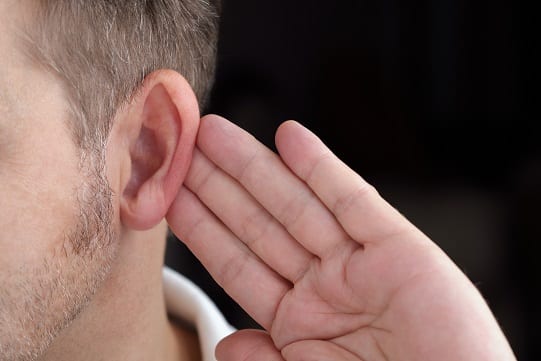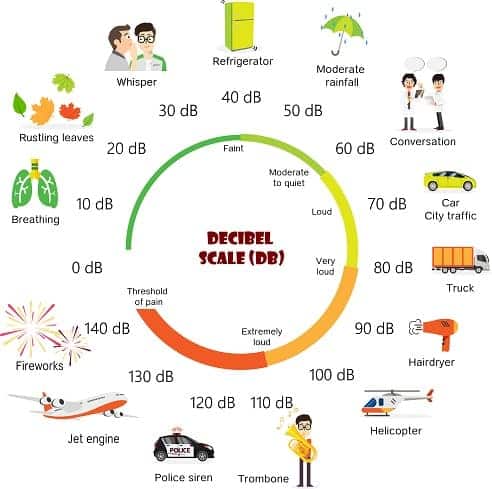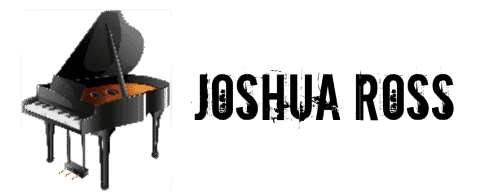As an Amazon Associate I earn from qualifying purchases.
Piano is such a wonderful instrument with perhaps the greatest dynamic contrast of them all. When playing you can achieve the softest pianissimo and the most roaring fortissimo. When it comes to soft playing that’s generally okay, but loud playing presents some unique obstacles. By that I mean the issue of potential hearing damage. So, can piano cause hearing loss?
While not typical, playing the piano can in fact cause hearing loss. The hearing damage a pianist might suffer from revolves around many factors. Things that play a role are the size of the piano, the practice space the instrument is located in, length of time spent playing and your proximity to the instrument when listening to another playing.
Want to Learn Piano?Click Here

Understanding Decibels
Whenever you do some sort of activity you’re going to generate sound. The loudness of that sound is measured in decibels. Whether it’s a vacuum cleaner, running a dishwasher or even playing the piano there’s different levels to it.
A safe level for listening for humans is measured at about 60 dB. That’s the loudness of a basic conversation. On the other hand once you get beyond 85 dB for an extended period of time hearing damage can occur. I personally use a dB meter like this one; it helps me get a reading of any loud activity once calibrated.
Below is a helpful dB chart so you can get an idea of how loud some common activities are. You can measure all of these with a dB meter, but this is generally what you can expect.

How Loud Is A Piano?
Now let’s look at how loud a piano is in terms of dB levels. When playing in an open room a piano will generate anywhere from 60 to 70 dB of sound. That’s still within our safe listening levels, but only accommodates for normal practice levels.
When playing a fortissimo section you might experience a spike in excess of 90 to 100dB. If you’ve ever been in the room while your piano is being tuned chances are you’ve heard some of these loud noises. Many piano tuners will strike the keys with a great deal of force so they can hear the pitch in full and tweak it’s intervals.
If you were to practice the piano for 3 hours each day at a normal practice level then you would certainly be fine. Light repertoire like Chopin Nocturnes and Bach Fugues might not harm you at all. On the reverse if you find yourself banging through Prokofiev Sonata No. 3 over and over again then chances are you are exposing yourself to a consistent stream of unsafe dB levels. Imagine hearing 84 to 103 dB over and over all day long.
Factors That Contribute To Loud Piano Practice
Outside of how you approach the piano or whether it’s being tuned, there are many factors that contribute to the loudness of the instrument. Even if the instrument itself isn’t loud other outside elements can affect what your ears are exposed to. Here’s a few of them below.
Room Size – I’ve been in a lot of practice rooms in my lifetime. From institutions of music to my own home, I can definitely vouch for room size and how it affects loudness.
If the piano is located in a small room chances are it’s going to get really loud in there. The sound has nowhere to really travel but from wall to wall. All of that sounds bouncing around is only going to swell into a big ball of loudness.
On the other hand if you have a space like a nice open living room, then you can give your piano some room to spread it’s wings. Vaulted ceilings also aid in the overall acoustics as well.
Floor Material – The size of the room has an impact on loudness, but that’s just one factor. The materials of the floor have a major impact too. I used to have my piano located on the tile in my living room. As you can imagine every note I played carried on for a much longer duration. The extreme ranges of the piano are what stuck out the most to me though.
I used to dread having to play anything in the bass end or on the high treble end of the instrument. Those notes caused such a loud ringing in my ears that I couldn’t bear to play any Liszt Etudes for much longer than 20 minutes at a time.
I decided to make a change and moved my piano to a smaller room, but with thick carpeted floors. The change was huge for me as the carpet sucked up a huge amount of sound. I’ve still got work to do on soundproofing the walls, but overall the changes were evident.
Open Lid Vs Closed – Outside of where your piano is located, having the lid open vs closed makes a big difference. Think about all the big concerts you go to. The lid is open so the sound can travel and be it’s richest and most detailed. In a small space that’s really not a great idea though.
Voicing – Not having your piano properly tuned and voiced can lead to more random outbursts of loud pitches. Think of those pianos you’ve played over the years. When you run up a C scale and that G sticks out like a sore thumb.
Now imagine trying to practice a piece only to deal with several higher dB notes poking out in your performance. Over time that lack of balance will impact your hearing; even at normal playing levels.
Side Effects Of Exposure To Loud Noises
Exposure to loud noises from music practice or any other sort of activity will definitely impact your hearing long term. That’s kind of dangerous because you might not know your hearing is messed up right away, so the tendency is to keep practicing anyway.
There are several short term side effects that you’ll experience though. Recognizing these and understanding what’s going on can give you a hint as to whether your hearing is suffering. Knowing how to recognize some of these warning signs will help encourage you to make adjustments. Here’s some things most pianists experience.
Ringing In The Ears – I’ve experienced this myself and I can tell you it sucks. This usually happens right after a long practice session, but can sometimes randomly occur later in the day too. It’s a loud whistle noise and sometimes will occur in just on ear too. That ringing is referred to as tinnitus.
Tinnitus is rather annoying, especially if it lasts for several minutes. Thankfully as I’ve taken care of my hearing I only experience it for a few seconds or not at all. Seeing a health professional can help with tinnitus and reversal of it through medication is also possible.
Ear Pain – Pain in the ears is almost always a clear sign of hearing damage. Whenever you hear a noise it simply hurts; even the soft pitches. Sometimes after a loud piano practice session my ears will have a little soreness to them. That’s a sign to me that I need to change what I do or protect my hearing from loud exposure or even switch up how I approach my repertoire.
Lack Of Sleep – Tossing over and over again is a sign of hearing issues. You’ll likely be dealing with tinnitus. On top of that you just might be sensitive to certain frequencies in general. A car driving by might seem much louder to you than it does to everyone else around you.
The same can be said for your preference to turn the TV down (or up if you really can’t hear it but everyone else can!). These are all some warning signs that your hearing is not quite where it ought to be.
Ways To Protect Your Hearing While Practicing Piano
Our hearing health is extremely important, and so is our love for music. Playing the piano generally won’t hurt your hearing if you go about it the right way. That’s not just how you play, but it’s related to where you play, monitoring the dB levels in your home and self assessment too. Below are some helpful ways I’ve gone about reducing my exposure to harmful dB’s when practicing so that I can continue to be my best as a concert artist too.
Use Earplugs – This was probably the smartest decision I made. In college our practice rooms were quite loud and I needed a way to protect my hearing. Normal earplugs aren’t desirable though because every frequency range seems to be evenly lowered.
When you play the piano high fidelity earplugs like Etymotics work best. They’ll reduce the dB levels significantly, but do it without completely muddying the sound. These earplugs are quite popular among construction workers too because it allows them to hear basic conversations clearly while still protecting their hearing. I often wear them to live concerts too so I can still enjoy everything.
Closing The Lid – This might seem simple, but not enough pianists do this. Surely an open piano lid provides you with a more consistent sounds and better detail, but it can be too loud sometimes! If your room doesn’t allow for safe listening with an open lid then you need to close it.
Open lids are designed for big open rooms and concert halls to make the instrument more audible to those further away. What I’ll sometimes do is take out the music stand, close the piano completely and then set it on top. This way I can still read my sheet music without having the piano open at all.
Limiting Your Practice – Lengthy exposure to loud music is not good. Whether you’re practicing or at a concert you need a break; even with the earplugs in. I like to limit my practice sessions by chunking into 20 to 30 minute sessions.
This usually gives my ears a good chance to get a break and regroup. My breaks are anywhere from 5 to 15 minutes long. If I need to practice longer then I’ll take frequent short breaks in between. Besides, I find this gives my fingers a chance to recoup and have a mental reset too.
Relocating Your Instrument – If the room is small, loud and just not ideal then it’s time to move your piano. The more open the space, the better the results. If you can have your piano in a living room not near the windows then that’s usually perfect. Make sure to face the instrument so that the opening isn’t facing a wall. That’s only going to cause the sound to bounce right off of that area causing a swelling of noise.
Soundproofing The Room – No matter what room you’re in, it’s a good idea to soundproof it. Soundproof panels are a good way to balance the sound out in your room, but they won’t necessarily cut down on the overall volume as one would expect.
Instead what you want to get is combine those panels with a soundproof curtain like one. The results are great too as 15 to 25 dB across an entire room would make a big difference. I feel a combination of this with the earplugs and panels would be perfect if the piano is in it’s own separate room.
Plus it makes recordings much easier to do if you plan to do that at home. You don’t even have to cover all of the walls with these curtains; only the areas that the sound is traveling directly too. They are really an inexpensive option and worth it for anyone who practices music at home.
Measuring The dB Levels – I’ve already mentioned the importance of using a dB meter like the BAFX3370,but can’t stress it enough. Whenever I’m practicing I’ll turn it on and face it towards my soundboard. As I play through passages the meter will give me accurate readings of just how loud I am. I’ll test all sorts of repertoire just to get an idea of what to expect.
For example, my Prokofiev Sonata has some loud passages that read at around 93 dB, but plenty of soft passages that read in the low 70’s. When I make a practice plan I can then determine how long I’ll work on certain passages so that I’m not exposing myself to too much loudness all at once. It’s really helpful and it actually helps maximize my production!
Hello & thanks for stopping by! I’m a professional concert pianist and piano instructor. In the United States, I’ve given successful performances in several places including New York, Florida, Connecticut, & New Jersey, I have also performed internationally in Italy and made my Carnegie Hall debut in 2014. I enjoy blogging about the piano, the art of performance, general music, current events and the latest in music production.

Ivan
Tuesday 21st of May 2019
I practise every day for 2 h in the morning and in evening. the most important is ear trening i use it 20 min each day to adaptet on the sound and loudness. I keep my digital piano at 60-70 % max. tnx for advices.
23 Ways to Improve Piano Playing - Joshua Ross
Saturday 28th of July 2018
[…] the piano a lot can be fun, but without proper hearing protection it’ll lead to hearing loss. With that said I recommend picking up a pair of high fidelity earplugs like the ER20XS. These […]